May 25, 2016

Finding Could Radically Speed Up Understanding of Genomic Information
In recent years, the amount of genomic data available to scientists has exploded. With faster and cheaper techniques increasingly available, hundreds of plants, animals and microbes have been sequenced in recent years. However, this ever-expanding trove of genetic information has created a problem: how can scientists quickly analyze all of this data, which could hold the key to better understanding many diseases, and solving other health and environmental issues.
Now, a University of Maryland School of Medicine researcher has helped develop an innovative computing technique that, on very large amounts of data, is both faster and more accurate than current methods. To spur research, a program using this technique is being offered for free to the biomedical research community.
“This is a whole new approach, with multiple opportunities for further development,” said Andrew F. Neuwald, PhD, Professor of Biochemistry & Molecular Biology and a Senior Scientist at the Institute for Genome Sciences (IGS) at the University of Maryland School of Medicine.
A description of the new method was published today in PLOS Computational Biology. Dr. Neuwald collaborated on the work with Stephen F. Altschul, PhD, a senior investigator at the National Center for Biotechnology Information at the National Institutes of Health.
Genomic sequence data encodes information regarding the structure and function of proteins, which comprise the basic cellular machinery and thus determine the structure and function of all microbes, plants and animals.
The new program is called GISMO, an acronym for “Gibbs Sampler for Multi-Alignment Optimization”. Gibbs sampling, a statistical technique for solving highly complex problems, is a central feature of the approach. In this case, sampling is used to find biological signals – relevant patterns that can help scientists better understand how organisms work. Neuwald says the approach improves upon conventional sequence alignment programs, which, unlike GISMO, can easily mistake random patterns in the data for biologically valid signals.
Current widely-used methods typically compare each sequence to every other sequence; this takes a prohibitively long time to compute for sets of a hundred thousand or more related protein sequences, which are now available for analysis. Neuwald describes these methods as “bottom up.” He and Dr. Altschul developed a technique that is “top down”; instead of comparing sequences to each other, it compares each sequence to an evolving statistical model. This approach is not only faster, but is also better at finding biologically relevant signals, which can, for example, help researchers unravel the mechanisms underlying cancer and inherited diseases. This technique becomes progressively faster than other methods as the size of the data set becomes larger.
Dr. Neuwald has a varied background, in molecular biology, computer science and Bayesian statistics and has been working on this technique for years. Dr. Altschul, whose formal training is in mathematics, was the first author on two landmark publications describing the popular sequence database search programs BLAST and PSIBLAST. They confirmed GISMO’s superior performance on large, diverse sequence sets by testing it against five widely used conventional methods. Dr. Neuwald is excited about GISMO’s potential: “Because researchers have been finding ways to speed up and improve conventional methods for decades and because GISMO takes such a new and different approach, I am confident that we can make GISMO even faster and more accurate going forward.”
GISMO is available for free to the biomedical research community through the IGS (http://gismo.igs.umaryland.edu/).
“This work combines two of the most fertile and dynamic areas in current science: big data and genomic analysis,” said UM SOM Dean E. Albert Reece, MD, PhD, MBA, who is also the vice president for Medical Affairs, University of Maryland, and the John Z. and Akiko K. Bowers Distinguished Professor. “In its creative linkage of analytics, statistics and genetics, this work points the way forward for a number of fields.”
About the Institute for Genome Sciences
The Institute for Genome Sciences, founded in 2007, is an international research center within the University of Maryland School of Medicine. Comprised of an interdisciplinary, multidepartment team of investigators, the Institute uses the powerful tools of genomics and bioinformatics to understand genome function in health and disease, to study molecular and cellular networks in a variety of model systems, and to generate data and bioinformatics resources of value to the international scientific community. igs.umaryland.edu
About the University of Maryland School of Medicine
The University of Maryland School of Medicine was chartered in 1807 and is the first public medical school in the United States and continues today as an innovative leader in accelerating innovation and discovery in medicine. The School of Medicine is the founding school of the University of Maryland and is an integral part of the 11-campus University System of Maryland. Located on the University of Maryland’s Baltimore campus, the School of Medicine works closely with the University of Maryland Medical Center and Medical System to provide a research-intensive, academic and clinically based education. With 43 academic departments, centers and institutes and a faculty of more than 3,000 physicians and research scientists plus more than $400 million in extramural funding, the School is regarded as one of the leading biomedical research institutions in the U.S. with top-tier faculty and programs in cancer, brain science, surgery and transplantation, trauma and emergency medicine, vaccine development and human genomics, among other centers of excellence. The School is not only concerned with the health of the citizens of Maryland and the nation, but also has a global presence, with research and treatment facilities in more than 35 countries around the world.
Contact
Office of Public Affairs
655 West Baltimore Street
Bressler Research Building 14-002
Baltimore, Maryland 21201-1559
Contact Media Relations
(410) 706-5260
Related stories
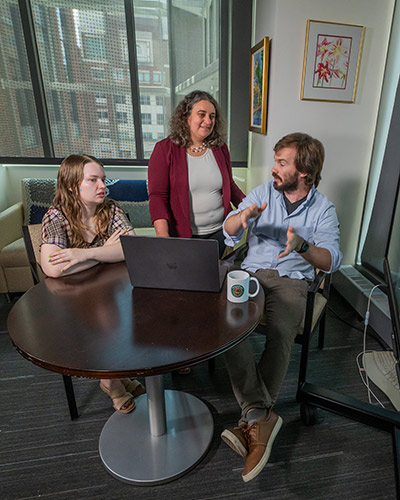
Friday, July 25, 2025
New Research Simulates Cancer Cell Behavior
In the same vein as weather forecast models that predict developing storms, researchers now have developed a method to predict the cell activity in tissues over time. The new software combines genomics technologies with computational modeling to predict cell changes in behavior, such as communication between cells that could cause cancer cells to flourish.

Wednesday, November 06, 2024
Genomic Databases Need More Diversity
It is commonly known that most genomic databases are biased toward people with European ancestry. Scientists have warned that leaving out other populations could skew results in areas such as drug development, diagnostic testing, and polygenic risk scores—which looks at many genetic variations in a person’s DNA to predict their disease risk.
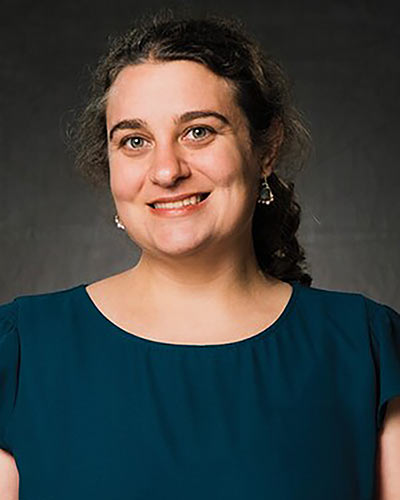
Wednesday, August 28, 2024
Leading Computational Scientist and Oncology Researcher Elana Fertig, PhD, Appointed as New Director of the Institute for Genome Sciences at the University of Maryland School of Medicine
University of Maryland School of Medicine (UMSOM) Dean Mark T. Gladwin, MD, announced today the appointment of Elana J. Fertig, PhD, FAIMBE, as the new Director of the School’s Institute for Genome Sciences (IGS). She is an internationally-recognized researcher known for her work in integrating spatial multi-omics technologies with mathematical models to develop a new predictive medicine paradigm in cancer. Spatial technologies allow researchers to learn about any cell type inside of natural tissue, including gene activity and cell interactions.

Wednesday, August 24, 2022
UM School of Medicine Study Finds a New Way to Optimize Treatment Success for Fecal Transplants
Fecal transplants have been successful in treating serious diarrheal infections but have often failed when tried with other diseases. Up until now, no one could predict why these treatments sometimes failed to help restore healthy bacteria in the colon. Researchers from the University of Maryland School of Medicine’s (UMSOM) Institute for Genome Sciences (IGS) have discovered important clues that could lead more personalized approaches to optimize treatment success. They published their findings in Cell Reports Medicine online earlier this month.

Thursday, July 28, 2022
Researchers Discover One of the Largest Known Bacteria-to-Animal Gene Transfer Inside a Fruit Fly
A fruit fly genome is not a just made up of fruit fly DNA – at least for one fruit fly species. New research from the University of Maryland School of Medicine’s (UMSOM) Institute for Genome Sciences (IGS) shows that one fruit fly species contains whole genomes of a kind of bacteria, making this finding the largest bacteria-to-animal transfer of genetic material ever discovered. The new research also sheds light on how this happens.
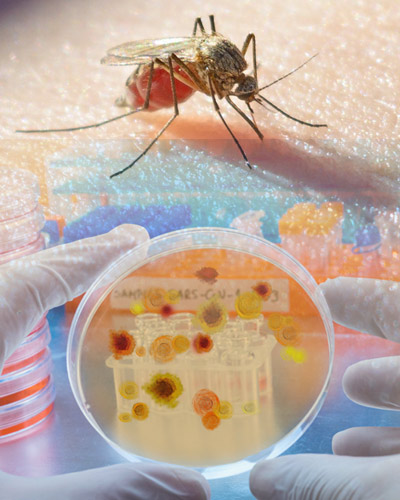
Monday, July 18, 2022
New Genomic Research Shows Why Testing Malaria Vaccines in the Clinic is as Rigorous as Natural Exposure in the Field
Malaria is the deadliest mosquito-borne parasitic infection of humans. In 2021, after a century of research, the World Health Organization (WHO) approved the world’s first malaria vaccine. That vaccine reduces the incidence of malaria infections in young children aged 5-17 months by only 30 percent, meaning that it remains critical to continue developing and testing more effective vaccines.

Thursday, March 18, 2021
UM School of Medicine Helps Maryland Conduct State-Wide Sequencing of Variants in Positive COVID-19 Test Specimens
In an effort to monitor the spread of COVID-19 variants in the State of Maryland, University of Maryland School of Medicine (UMSOM) Dean E. Albert Reece, MD, PhD, MBA, announced that UMaryland Genomics at UMSOM will perform genome sequencing of variants in at least 10 percent of COVID-19 test samples, reaching an important benchmark set by the federal government to help control the spread of these variants.

Thursday, February 25, 2021
UM School of Medicine Researchers Participate in Landmark Study Detailing Sequencing of Full Human Genomes to Better Capture Genetic Diversity
Researchers at the University of Maryland School of Medicine (UMSOM) co-authored a study, published today in the journal Science, that details the sequencing of 64 full human genomes. This reference data includes individuals from around the world and better captures the genetic diversity of the human species. Among other applications, the work will enable population-specific studies on genetic predispositions to human diseases as well as the discovery of more complex forms of genetic variation.

Wednesday, February 26, 2020
Researchers Develop First Catalogue of Genes that Comprise Community of Microbes in Vaginal Microbiome
University of Maryland School of Medicine’s (UMSOM) Institute for Genome Sciences (IGS) researchers have created the first catalogue of genes that comprise the community of microbes, which inhabit the human vagina. The catalogue, called human vaginal non-redundant gene catalog (VIRGO), was recently released as a public resource that can be used by researchers to facilitate a more in-depth understanding of the role of vaginal microorganisms in women’s health and to potentially develop future treatments for certain gynecologic conditions.

Tuesday, December 03, 2019
UM School of Medicine Researchers Institute for Genome Sciences' Researchers Discover Potential New Treatment for Tropical Parasitic Disease Using Genomics
Using innovative RNA sequencing techniques, researchers at the University of Maryland School of Medicine (UMSOM) Institute for Genome Sciences identified a promising novel treatment for lymphatic filariasis, a disabling parasitic disease that is difficult to treat. The potential new therapy is an experimental cancer drug called JQ1 and targets proteins found prominently in the worm’s genome; it appears to effectively kill the adult worms in a laboratory setting, according to the study which was published today in the journal mSystems.

Tuesday, August 13, 2019
Researchers Identify How Vaginal Microbiome Can Elicit Resistance or Susceptibility to Chlamydia
The vaginal microbiome is believed to protect women against Chlamydia trachomatis, the etiological agent of the most prevalent sexually transmitted infections (STIs) in developed countries. New research by the University of Maryland School of Medicine (UMSOM) shows how the microbiome can either protect or make a woman more susceptible to these serious infections.

Thursday, April 04, 2019
UM School of Medicine's Institute for Genome Sciences Awarded $17.5 Million Grant for Infectious Disease Research
The Institute for Genome Sciences (IGS) at the University of Maryland School of Medicine (UMSOM) was awarded $17.5 million from the National Institute of Allergy and Infectious Diseases (NIAID) to fund the IGS Genome Center for Infectious Diseases (GCID) for another five years.

Wednesday, March 27, 2019
New Study Finds That Bacteria and Immunity in the Cervix May be Key to Predicting Premature Birth
Spontaneous preterm birth (sPTB), defined as birth before 37 weeks of gestation, and the related complications, are the largest contributors to infant death in the United States and worldwide, according to the World Health Organization. Researchers at the University of Maryland School of Medicine (UMSOM) have discovered that bacteria and innate immune factors in a woman’s birth canal and cervix may increase the risk of spontaneous preterm birth or provide protection against such births.

Tuesday, February 12, 2019
UMSOM Scientists Call for Unrestricted Usage of Public Genome Data
Researchers at the Institute for Genome Sciences (IGS) at the University of Maryland School of Medicine (UMSOM) called for open access to genome data, stating that unrestricted usage is needed for progress in combating the world’s most serious diseases.
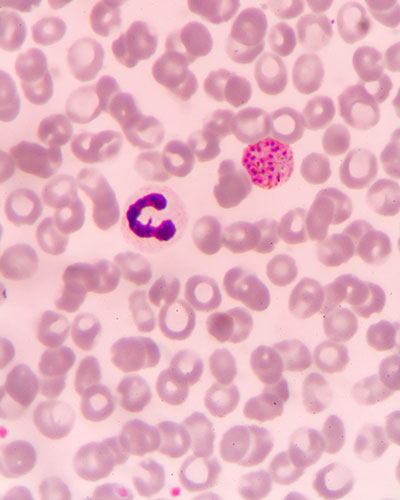
Friday, February 08, 2019
University of Maryland School of Medicine Genome Scientists Develop Novel Approaches to Studying the Most Widespread Form of Malaria
Scientists at the Institute of Genome Sciences (IGS) at the University of Maryland School of Medicine (UMSOM) have developed a novel way with genome sequences to study and better understand transmission, treat and ultimately eradicate Plasmodium vivax, the most widespread form of malaria.

Thursday, September 27, 2018
University of Maryland School of Medicine Scientist Receives Prestigious Microbiome Award
Owen White, PhD, professor of epidemiology and public health, and Associate Director for Informatics at the Institute for Genome Sciences (IGS) at the University of Maryland School of Medicine (UMSOM), has received the 2018 Microbiome Pioneer Award. The prestigious honor is part of the Bioinformatics for the Microbiome Symposium organized by Stanford University. The microbiome is the name given collectively to the community of trillions of microbial organisms that live on and within our bodies.
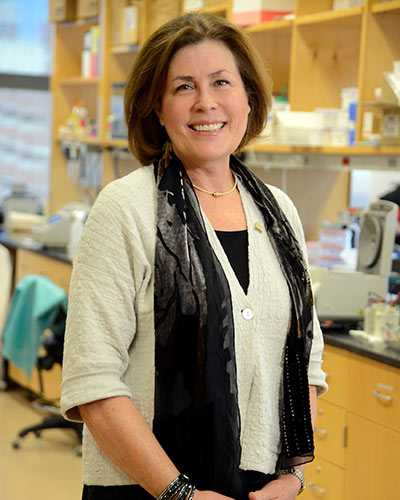
Monday, May 14, 2018
New Research: Some Gut Bacteria May Protect Against Intestinal Infection
Scientists at the University of Maryland School of Medicine (UMSOM) have for the first time found evidence that the presence of a key species in the human gut microbiome is associated with protection from infection with typhoid fever. If the research is borne out, it could offer an exciting new way to reduce intestinal infections from microbes.
